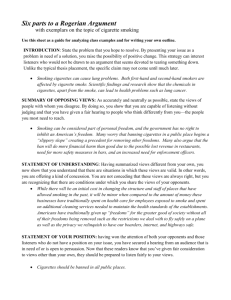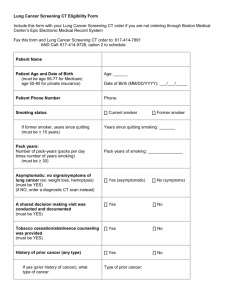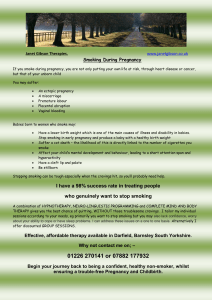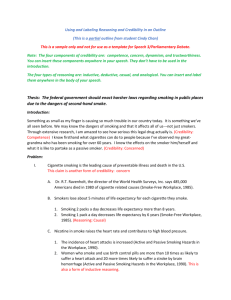Smoking_and_Your_Lungs - The Orchard Medical Practice
advertisement
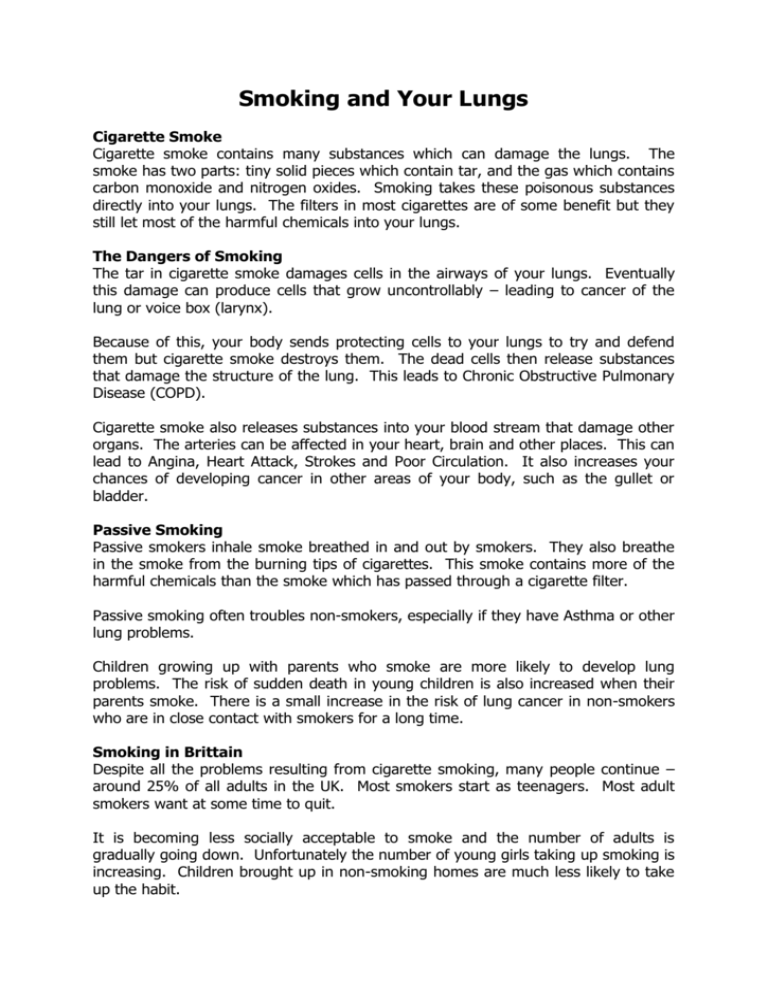
Smoking and Your Lungs Cigarette Smoke Cigarette smoke contains many substances which can damage the lungs. The smoke has two parts: tiny solid pieces which contain tar, and the gas which contains carbon monoxide and nitrogen oxides. Smoking takes these poisonous substances directly into your lungs. The filters in most cigarettes are of some benefit but they still let most of the harmful chemicals into your lungs. The Dangers of Smoking The tar in cigarette smoke damages cells in the airways of your lungs. Eventually this damage can produce cells that grow uncontrollably – leading to cancer of the lung or voice box (larynx). Because of this, your body sends protecting cells to your lungs to try and defend them but cigarette smoke destroys them. The dead cells then release substances that damage the structure of the lung. This leads to Chronic Obstructive Pulmonary Disease (COPD). Cigarette smoke also releases substances into your blood stream that damage other organs. The arteries can be affected in your heart, brain and other places. This can lead to Angina, Heart Attack, Strokes and Poor Circulation. It also increases your chances of developing cancer in other areas of your body, such as the gullet or bladder. Passive Smoking Passive smokers inhale smoke breathed in and out by smokers. They also breathe in the smoke from the burning tips of cigarettes. This smoke contains more of the harmful chemicals than the smoke which has passed through a cigarette filter. Passive smoking often troubles non-smokers, especially if they have Asthma or other lung problems. Children growing up with parents who smoke are more likely to develop lung problems. The risk of sudden death in young children is also increased when their parents smoke. There is a small increase in the risk of lung cancer in non-smokers who are in close contact with smokers for a long time. Smoking in Brittain Despite all the problems resulting from cigarette smoking, many people continue – around 25% of all adults in the UK. Most smokers start as teenagers. Most adult smokers want at some time to quit. It is becoming less socially acceptable to smoke and the number of adults is gradually going down. Unfortunately the number of young girls taking up smoking is increasing. Children brought up in non-smoking homes are much less likely to take up the habit. The Benefits of Quitting The sooner you quit, the less likely it is that your lungs and other organs will be damaged. Symptoms such as coughing can get better with days or weeks. If COPD has started to develop, quitting smoking will prevent further damage. Continuing to smoke cause a steady increase in shortness of breath. This limits your activity and increases the risks of lung and heart failure. It is never too late to think about quitting. The risk of lung cancer increases the more you smoke, and the longer you smoke. Once you quit, the risk of lung cancer starts to go down. After ten years of off cigarettes, the risk is halved compared to the risk if you had continued smoking. Whilst some people go through life unaffected by smoking, millions do not. Too many people think ‘It will never happen to me’ – until they develop cancer or have their first heart attack. Quitting Smoking Quitting smoking can be very difficult, but many smokers find it easier than expected. More and more people are managing to quit the habit. A ‘Smoking Cessation Clinic’ is held at the Practice. For further information please ask at Reception or telephone 01455 282599. The above Information has been extracted from the leaflet ‘Smoking and your lungs’ by the British Lung Foundation. For further information: 08458 50 50 20 enquiries@blf-uk.org www.lunguk.org



